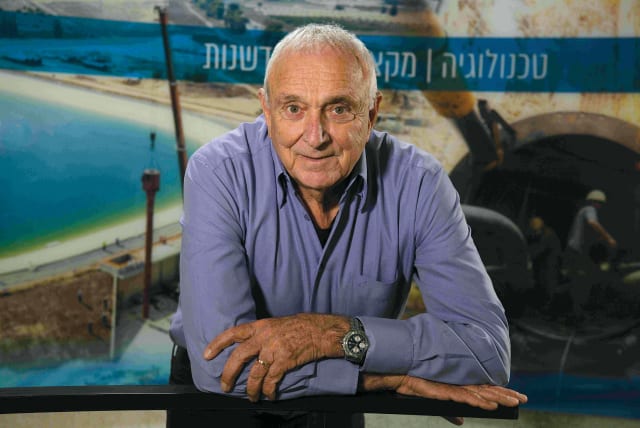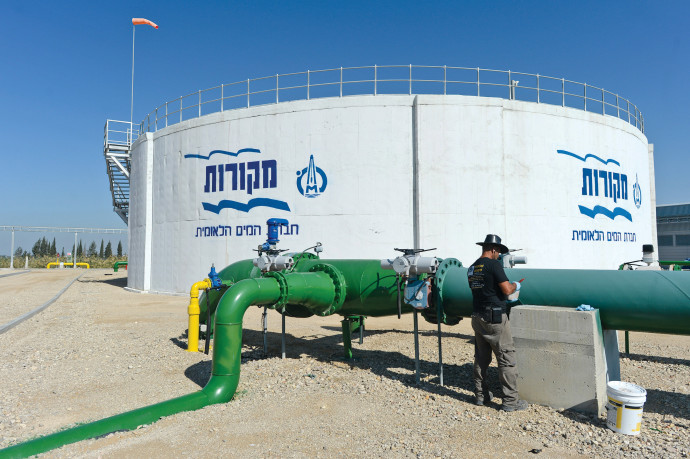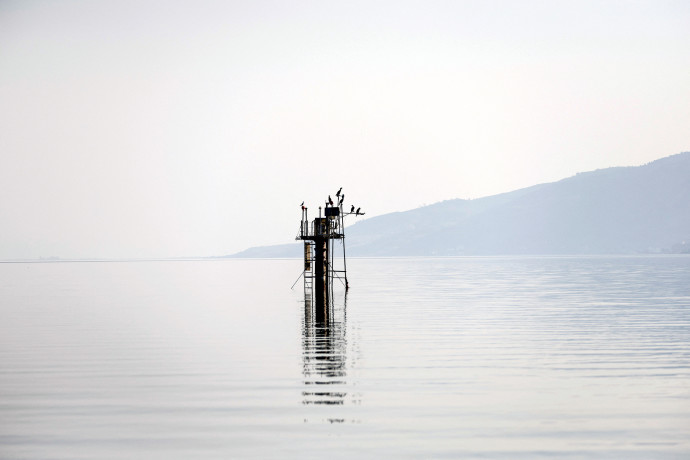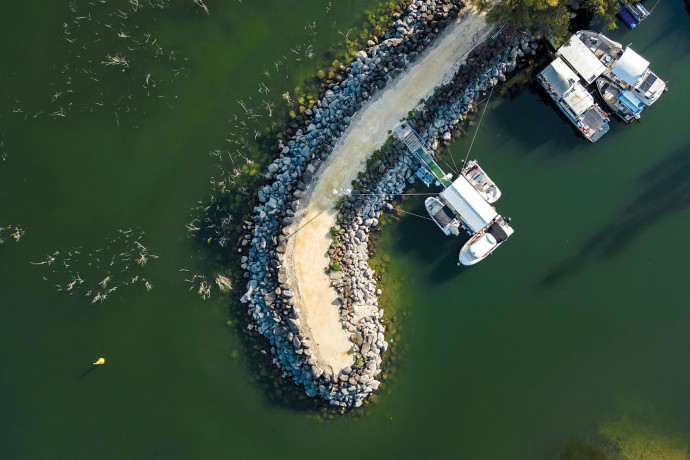Managing Mekorot: A conversation with the man in charge of Israel’s national water company

Yitzhak Aharonovich talks to the Jerusalem Post about his new role the chairman of Mekorot who helped turn a water sector in crisis into an enterprise that produces a surplus of water.
Yitzhak Aharonovich, the son of Holocaust survivors, a moshavnik and officer in the IDF Paratroopers Brigade, accepted an offer to enlist in the Border Police, became a commander, and went on to work with the Israel Police. After completing his political career, which included serving as minister of tourism and minister of public security, he became a private citizen. Last year, he became chairman of Mekorot and helped turn a water sector in crisis into an enterprise that produces a surplus of water.
Name: Yitzhak Aharonovich, 72, chairman of Mekorot.
Who I am: I am a sensitive person, and I love people. I can speak to people of all types because I know where I come from. I am not adventurous or greedy, I don’t deal with nonsense, and I am not extravagant.
Roots: Both sides of my family originally came from Poland. My father was born in Lithuania and was a watchmaker and jeweler. He was married and had two sons when the war broke out. One morning, he went to work, and when he returned he saw his children being put on a truck and taken away. They were executed in the killing fields, and his wife was also murdered. When he fled to the forest, he met my mother. After the war, they boarded an immigrant ship and eventually reached Jerusalem.
My father was 25 years older than my mother, and he wanted to start a family to ensure continuity. My parents didn’t talk about their experiences. My mother had a blackout and couldn’t remember the names of her parents and her 10 siblings. When my father was on his deathbed, I asked him to write down his memories, and he documented them in Yiddish.
After three years in Jerusalem, where I was born, we moved to a transit camp, and from there, we went to Moshav Dishon in the North. We had four chickens, a cow and a donkey. We grew tobacco and settled near the border with other new immigrants.
My childhood: I grew up in Dishon. The financial situation at home was difficult. Four children lived in one room. We ate what there was, and we lived off the money that my parents would receive in advance for the following year. Despite this, I had a wonderful childhood, with a mother who didn’t leave us for a minute because of her trauma.
he constantly worried and ensured that I ate enough and was healthy. I played soccer, marbles, and nail-tossing games and had no particular ambition. I studied in a state religious school. Since there was no high school in the area, I was sent to study at a yeshiva in Safed and graduated from the Mosenson school in Hod Hasharon.
Rimon: My wife. We met at a dance class in Tiberias on the shores of the Sea of Galilee. We have four daughters and 13 grandchildren, and we live in Netanya.
Rimon has managed our farm for most of her life, and she is the one who leads me. She has excellent feminine intuition. Everything I say, she does the opposite, and she is right. Rimon is a wonderful mother and an amazing grandmother.
Border Police: After completing my service as an officer and staff sergeant in the paratroopers, I returned to the moshav for two years to become eligible to receive land as the child of a farmer continuing in agriculture. I received a plot of land and a house. I had a chicken coop, 30 dunams with apples, grapes, pears, plums, and two tractors, and nearby was a Border Police base. One day, the Border Police commander sent me a summons for an interview and suggested that I enlist and work on the farm simultaneously. I was already married, and I told my wife, “You take the farm, and I’ll help you.” I remained there for 22 years and finished as commander of the Border Police.
From there, I joined the police. I traveled with my wife and daughter to New York for two years as an attaché to the Israel Police in the US. I didn’t enjoy my work there. When I returned to Israel, I was appointed commander of the Judea and Samaria district, and after three years I became commander of the Southern district. I served as deputy superintendent of the Israel Police; when I was not appointed to the position of superintendent, I resigned. Soon after, I was appointed CEO of the Dan Transportation Company. I worked there for a year, changing the company from a cooperative to a private company. When they appointed a person from within the company, I moved on.
Politics: Six months after leaving Dan, Avigdor Liberman, whom I didn’t know, called me and offered me to be on the list for the Yisrael Beytenu party. It took me a few days to agree. I was sure nothing would happen, but the party received nine mandates and I entered the Knesset. I had arrived in a new place that I didn’t know. A few days later, Liberman asked me which committee I wanted to join and informed me that I would be appointed deputy speaker of the Knesset.
When the day came for me to run the plenary, I had no idea what to do. Yardena, the Knesset secretary, reassured me and said, “Don’t worry. At 4 p.m. you will strike the gavel, and I will be your whisperer.” I banged the gavel and prayed that no one would ask any questions. Soon after, I became comfortable ejecting unruly Knesset members from the hall.
Minister of Tourism: When the distribution of portfolios began, Esterina Tartman, who was slated to become minister of tourism, became entangled in a controversy for claiming that she had a master’s degree, when in fact she had not received this degree. When reporters at a press conference asked Liberman who would replace Tartman as tourism minister, he pounded on the table and said, “Aharonovich.” The cameras turned to me, and I had no idea. My wife was watching at home and asked, “Why didn’t you let me know beforehand?” I had to explain that I didn’t know myself before it happened.
I was supposed to replace Isaac Herzog as the minister of tourism, and he was supposed to become the minister of welfare and social services. He picked up the phone and said that he would stop by for coffee. “Listen,” he said, “you take welfare and social services, and I will continue with tourism.” I thought it was a gift from God because welfare was the ideal position for me, but I said I had to speak with Avigdor Liberman. When I called him, he swore and said, “Do you understand what this means? The Ministry of Tourism is a plum portfolio, with vacations and trips abroad.
Why do you want the Ministry of Welfare? Later, Herzog told me, “Your boss was right.”
I was on the job for less than a year, and then, while attending a conference in Paris, I received a call from Liberman. “When are you coming back?” “Tomorrow,” I replied. “You’re coming back in four days,” he said, “because we’re resigning from the government. Enjoy.” There went my craving for government.
Minister of Public Security: I served as minister of public security twice, for a total of six years, amid murders, explosions and stabbings. I took the job seriously. Continuity has meaning in all jobs, especially in this role. I came as a policeman, and I got to know the officers and the field. It takes time for a new minister to learn the job. A citizen can fill the position, but there is no doubt that it is much easier if one is familiar with police work. The 2010 Mount Carmel forest fire occurred during my tenure, and the fire department also was under my authority.
Governance in the South and North: There is no doubt that over the years, there has been a problem with governance, which is why so many voted for Itamar Ben-Gvir in the most recent elections. The deterioration in governance there followed cuts in budgets and the workforce, and a police commissioner was not appointed for some time. There is no magic to it. It is a combination of long processes with enforcement, increased punishment in the courts, welfare and education. Only the combination of all these will bring about an improvement in the situation.
Politics: I don’t miss it. When I see the status of the Knesset, the language and the culture, I don’t want to be there. After nine years, I completed my political term in a dignified manner. I had an open and friendly conversation with Avigdor Liberman, and I said I wanted to go into the private and public markets. I served as chairman of Israel Aircraft, and after the sale to Elbit, I became a freelance consultant for three years.
Mekorot: I was interested in the Israel Electric Corporation and Mekorot. When the position of chairman of Mekorot became available a year ago, Avigdor asked me if I was interested. It’s the best company, with excellent management and employees.
Increase in the water tariff: The water tariff is set by the Water Authority and not by Mekorot. There is no shortage of water in the State of Israel. There is actually a surplus, but there is a problem with water transmission to places where there is a shortage of effluent water for agriculture, in the Upper Galilee, the Golan Heights and the Negev.
Mekorot’s share of the tariff is 20% in total, while the water corporations’ share is 22% of the tariff that is paid by the citizens. In recent years, we have doubled the scope of our work, and we have established a development plan of almost NIS 2 billion.
Water to Jordan: We have reached the maximum capacity that we can supply and that they can receive. The Jordanians cannot desalinate water, so it was decided that we would provide them with water, and they would give us solar energy in return, funded by the Emirates, which mediated the negotiations. Everything is signed and is supposed to be carried out once we begin to transmit the water.
Gaza receives half of their water from Mekorot, and its infrastructure provides water for a few hours daily. Until they begin transporting water or setting up a desalination plant, they rely on us at a full payment rate. We are also the water suppliers to the Palestinian Authority and deal with water thefts in the South Hebron Hills.
Cyber attacks: We are one of the most well-protected companies in the economy and are guided by the National Cyber Authority.
The flow of water to the Kinneret: The inverse carrier is an idea that was born a few years ago. The goal was to move from “Israel is drying up” to a water surplus.
Mekorot’s leaders considered what to do with the surplus water from the desalination plants and decided that returning it to the Sea of Galilee (Lake Kinneret) would fill it and turn the area into a lovely tourist area again. We recently inaugurated a facility located inside a national park in Nahal Zalmon, and the water will flow to it as needed when the northern desalination plant in Acre opens.
International operations: We market knowledge, and provide advice and technology in Bahrain, Morocco, Argentina, India, Azerbaijan, Turkey and Cyprus. Experts come from Europe and the US to get insight from us because they are dealing with a water crisis for the first time due to climate change. Beyond desalination, the amount of water here that is lost is 3% compared to 25%-40% in Europe because of the use of effluent water.
Technology: Our innovation unit is managed by David Blaser, who looks for start-ups that can be brought to the water sector, even if they are not directly engaged in the field, from cyber defense to the production of chlorine from water, making chlorine transport unnecessary, which can endanger the environment. We have invested in seven start-ups at a stake of 20%, the maximum allowed by the state.
Fiber optics: We have 13,000 km. of piping that we monitor 24/7, using fiber optics. We told the state that anyone who wants to transmit high-speed Internet can contact us and save the costs of setting up relay facilities. This is not our primary business, but we welcome anyone who comes to us at their own initiative.
Leisure: I go to the gym every morning at 5:30 to work out. Then I return home, shower, and go to work. The weekend is dedicated to amazing meals, trips in the North and South, and supporting the Hapoel Tel Aviv soccer club.
Future outlook: My term ends in two years, and I will be here for as long as they want me. At home, they tell me, “It’s time for you to take a cruise to the Caribbean or spend two months in the East.” I know that after five days, I’d go crazy.
Translated from Hebrew by Alan Rosenbaum.
Jerusalem Post Store
`; document.getElementById("linkPremium").innerHTML = cont; var divWithLink = document.getElementById("premium-link"); if (divWithLink !== null && divWithLink !== 'undefined') { divWithLink.style.border = "solid 1px #cb0f3e"; divWithLink.style.textAlign = "center"; divWithLink.style.marginBottom = "15px"; divWithLink.style.marginTop = "15px"; divWithLink.style.width = "100%"; divWithLink.style.backgroundColor = "#122952"; divWithLink.style.color = "#ffffff"; divWithLink.style.lineHeight = "1.5"; } } (function (v, i) { });




